
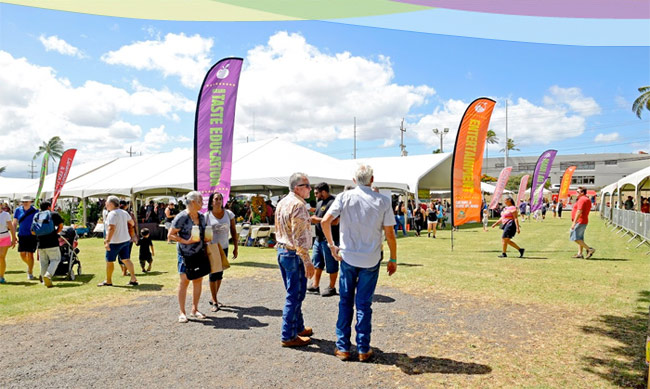
Maui AgFest & 4-H Livestock Fair to Return in 2022
We had high hopes for Maui AgFest & 4-H Livestock Fair this year; however, due to Covid-19 and the rules and regulations surrounding public health and safety, MCFB’s signature event will not take place at War Memorial in 2021. In place of our popular event, MCFB plans to launch a Grown on Maui marketing campaign, and our event partner, the Maui 4-H Youth Livestock Association, will host a livestock show (no auction). Continue to save the date for June 5, and stay tuned for more information about the campaign and livestock show.
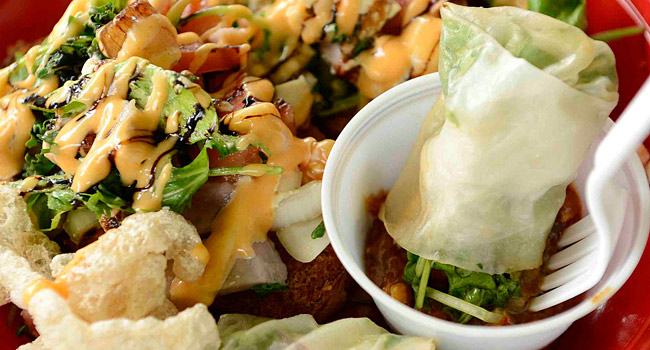
‘Cooking Hawaiian Style’ is Cooking on Maui
Maui County Farm Bureau will be the title sponsor for season 15 of “Cooking Hawaiian Style.” On April 7 and 8, a production crew with film industry professionals from Maui and O’ahu will be staged at Kula Country Farms. They will film 13 episodes that will air on OC16 starting July 5 for 26 weeks. We hope you’ll tune in to watch the show and meet show host Lanai Tabura as he celebrates the richness of Hawai’i’s culinary culture with Hawaiian and Hawaiian-style recipes from all ethnicities. Sponsoring CHS is part of MCFB’s Grown on Maui, Buy Local campaign. We’re excited to showcase some of our members along with fantastic Grown on Maui produce, proteins and products.

In addition to “Cooking Hawaiian Style,” plans are underway to announce other components of MCFB’s Grown on Maui, Buy Local campaign in June. We are now finalizing details for our very own monthly produce box, as well as dining and retail promotions. The GOM campaign will be supported by a new and robust advertising, public relations and social media plan.
But first, time for a refresher…
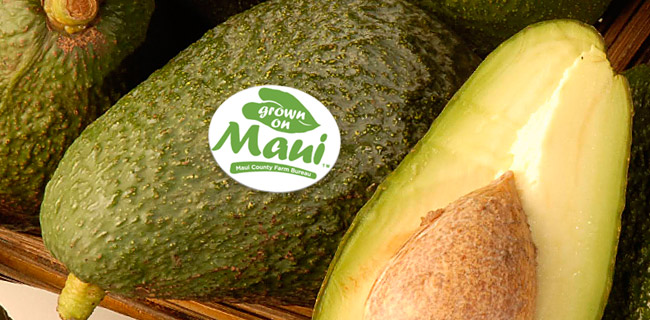
| Did you know? More than two decades ago, then-Mayor Linda Lingle and the Maui County Office of Economic Development worked with Maui County Farm Bureau to ensure that Maui-grown agricultural products were identified and officially trademarked as Grown on Maui. Grown on Maui applied to everything from apple bananas and protea to watermelons and zucchini and everything in between. We’re talking about grapes grown in the vineyards at MauiWine, cacao from orchards in Kuʻia, onions, olives, and native trees grown in the uplands of Kula, and taro from every part of Maui: from Waikapu and Honokowai all the way to Hāna. All of these agricultural crops could be marketed as Grown on Maui and in doing so be recognized as 100% Grown on Maui. In addition, value-added agricultural products could only use the Grown on Maui trademark if their product was made with a 100% Grown on Maui agricultural product. |
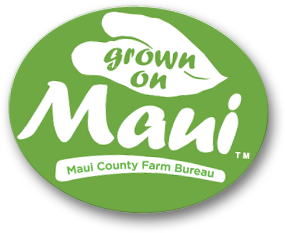
MCFB wants to be sure its members are taking advantage of this marketing opportunity. Go online to www.mauicountyfarmbureau.org/grown-on-maui to register your business and obtain usage rights to the trademarked logo. In addition, you will be able to request information on how you can order Grown on Maui stickers to place on your product or to use on signage to market your product.

Livestock Forage Disaster Program (LFP) Compensation available!
The Secretarial drought disaster designation makes farm operators in Maui County eligible for the Livestock Forage Disaster Program (LFP). LFP provides compensation to eligible livestock producers who suffer grazing losses for covered livestock due to drought. For more information on LFP you can click on this link: www.fsa.usda.gov/Assets/USDA-FSA-Public/usdafiles/FactSheets/livestock_forage_program_lfp-fact_sheet.pdf Farmers and ranchers may also apply for FSA emergency loans. Farmers have eight months from the date of a Secretarial disaster declaration to apply for emergency loans.
All applicants to USDA programs must establish basic farm records. The applicant may contact James Robello, USDA Farm Service Agency, for more information on establishing farm records. Jame’s telephone is 808-871-5500 extension 1740. Interested applicants to all FSA programs may contact the USDA Farm Service Agency office in Kahului at 808-871-5500 ext. 2 for assistance. USDA Farm Service Agency is located at 77 Hookele Street, #201, Kahului, HI 96732.


Aloha Members,
The Hawai‘i State Legislature’s Second Lateral deadline was on March 25, 2021. Second Lateral is the deadline by which all bills with multiple committee referrals must move to their final referred committee(s) in the non-originating chamber to remain viable for this session. However, language from a bill that is no longer viable may be inserted into another moving bill.
| For bills to remain active, they must be passed out of their final referred committee and decked by April 9, 2021 for Third Reading. The Hawai‘i Farm Bureau Government Affairs Committee continues to track and provide testimony on the remaining bills that may impact agriculture either positively or negatively. We ask for your continued support by submitting testimony as needed. It is important that you understand the legislative process and how these measures can impact your business. Warren K. Watanabe Executive Director |

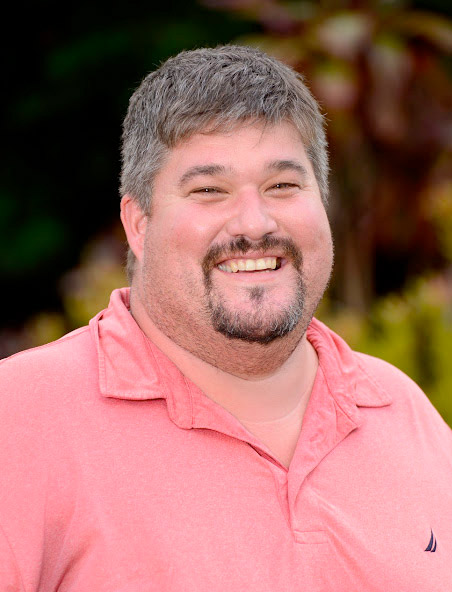
Happy Spring!
While 2020 is in the rear-view mirror, we are still dealing with COVID. All the while, the resiliency of our farmers and ranchers has been evident; they have dealt with rising costs, softened market prices, and persevered despite the drought and damage caused by feral hogs and axis deer. These individuals continue to produce food for our community throughout the pandemic, and they deserve our appreciation.
| Over the past year, we have had great outcomes with programs that support the success of our farmer and ranchers. Mahalo to Mayor Victorino, JoAnn Inamasu from Office of Economic Development, and various members of the county council that have made investing in our agricultural community a top priority! The new year brought some rainfall, helping to remedy the effects of drought, helping cover crops get off to a good start for many farmers, while also sparking some new grass growth in pastures, relieving some short-term burden for ranchers. The March rains came down in buckets, flooding several areas that lead to wiping out fences, early spring plantings, and in some cases, homes were lost. We pray for rain, and often work in the mud to achieve our goals. Our board continues to hold monthly meetings by zoom and is working hard to tackle new and ongoing issues facing the agricultural community. The year 2021 brings its own new challenges and many legislative items to consider. One of the bills that we are advocating for, is to ensure the long-term productive use of agricultural lands across the islands by transferring state leases to HDOA, which is better equipped to manage these agricultural lands. MCFB recognizes that ranches produce more than just livestock – they provide a cultural landscape and many ecosystem services that help manage natural resources, improving water filtration, reducing wildfires and fuel loads through managed grazing; also providing wildlife and native plant habitats. Even though the traditional AgFest format for 2021 was cancelled, the new year also brings HOPE. As we wrap up the first quarter, I am excited to announce that the Maui 4-H Youth Livestock Program has remained active with skill development activities associated with their animal projects. These keiki are awesome, and have steers, heifers, swine, goats and lambs under their management. We are thrilled that these youth will be able to have a live, in-person show for their exhibits this June. More details for this event to come. Mahalo, Kyle Caires President |

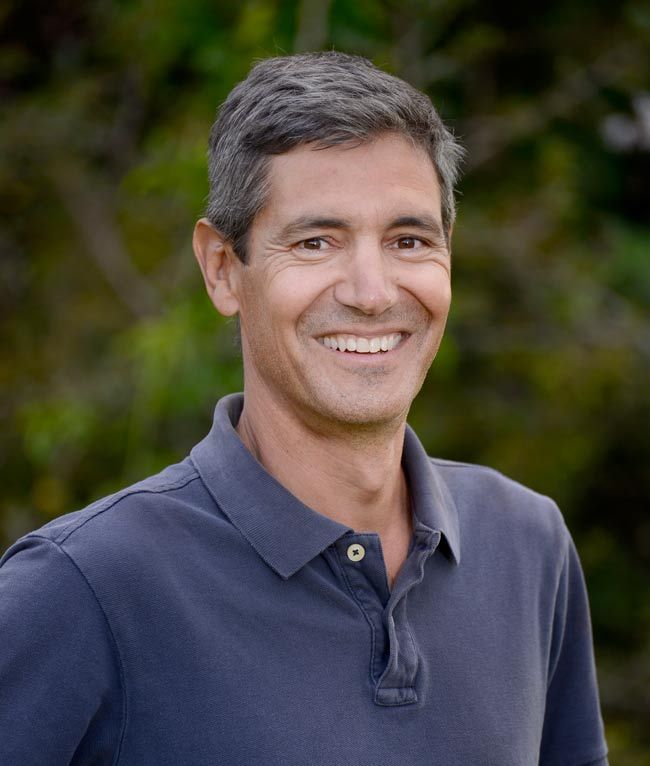
Meet Mario Gaggero, Board Member Mario Gaggero, owner of Hawaii Seed Pro LLC, is a board member of Maui County Farm Bureau. Hawaii Seed Pro is a research company that executes complex breeding projects including crossing nurseries, trait integration/continuous nurseries, generation advancement and pilot seed productions.
| With Hawaii Seed Pro, Mario grows vegetables and seeds under contract. Mario was a former longtime leader at Monsanto, winning numerous awards for his work, including Monsanto Technology Above & Beyond Award for Seed Chipping Implementation at the Kihei site in 2011. As the Maui Site Lead from 2016 to 2018, he managed a cross-functional team of 250 with oversight of Monsanto’s corn biotech pipeline. He worked with leadership to develop strategic plans to meet corporate goals and held multimillion-dollar budgeting responsibility. Acting as the face of the company within the community, he boosted the company’s reputation by speaking in public forums and participating in community boards such as Maui County Farm Bureau and Workforce Development Board. He finds value in MCFB membership as “a place where people share the same issues that I have, facing the same challenges and a great place to network.” Mario grew up in a ranch in Uruguay, South America. He earned a B.S. degree in agronomy and crop science at University of the Republic, Montevideo, Uruguay; and an M.S. in plant breeding and molecular genetics from University of Minnesota, St. Paul. |
| “Maui farming faces a lot of challenges but mainly farmers need land and water at competitive prices,” Mario says. “Government entities must act fast to release those resources before is too late and we lose most of the independent farmers. Food retailers also need to understand the cost of farming in Hawai‘i making sure prices are reflective of these realities.” |

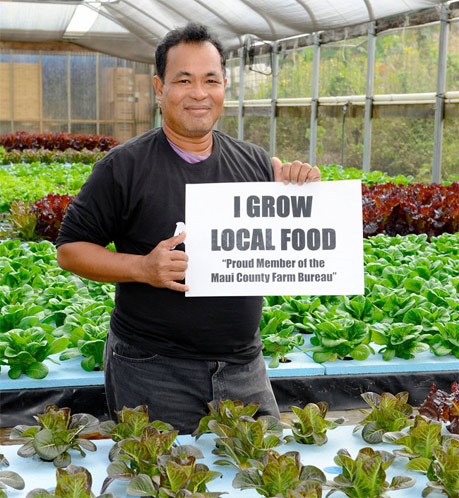
Noel Escobedo, Owner of Noel Escobedo Farms
Noel Escobedo has farmed small, and he’s farmed big. Now he’s back to farming small, and that’s just how he likes it. Noel currently farms nine acres in Kula, the property that he calls “the fruit of my hard work.” Together with his wife Gemma and three full-time employees, he produces bok choy, kale, greenhouse tomatoes, and hydroponic lettuce as the main crop, along with basil, cilantro and strawberries.
| Noel’s is a true success story, from his first role on Maui as an agricultural trainee in 1983, to running Noel Escobedo Farms today. As an active 4-H member in the Philippines, Noel qualified for an 18-month program sponsored by the Philippine Department of Agriculture and the Maui Agriculture Training program in cooperation with UH College of Tropical Agriculture and Human Resources. “Training at Yoshio Arakaki farms opened my eyes to the farm business,” Noel says. “I told myself that this is the job I want: to be a farmer someday.” During his training, Noel met Maui farmer Takeo Miyaguchi, who later sponsored Noel to attend UH. |
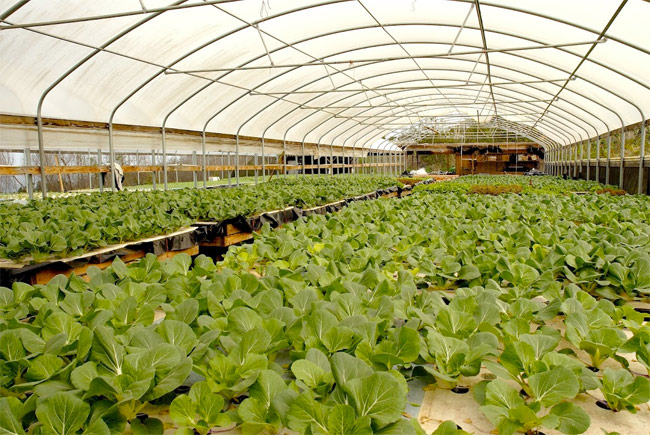
| “I used to come back to Maui every weekend to help Takeo at his farm, and at the same time tend my small farm that Takeo gave me,” Noel says. “That small farm, maybe half-acre in size, enabled me to finish my study, paid my rent, my food in Honolulu and my plane fare every week. There I realized that farming requires proper planning and good organizational skills to succeed.” |
| Being both student and farmer was tough, but Noel graduated with a degree in Agriculture and Resource Economics from UH Manoa in 1993, and was hired as farm manager at Yoshio Arakaki Farm Inc. In 2003, Yoshio retired, and Noel took over ownership of the farm and operations. During this time, Noel says he was “so aggressive and determined” that he expanded the leased farm to almost 70 acres with more than 15 employees, and his market reached to California. He planted Maui onions, head cabbage and Napa cabbage year-round and maintained his market statewide. By 2013, he was ready to downsize to the current nine acres which he owns. Despite the challenges of the past year, he and Gemma are enjoying farming with their downsized farms. “My crops diversification and farm operation set-up enable me to maintain cashflow even in an adverse climate and situation,” he says. He sells his produce to Maui wholesalers, restaurant and supermarket accounts, and farmers markets. Together with aid from federal and state agencies due to the pandemic, Escobedo Farms has been able to make ends meet. |
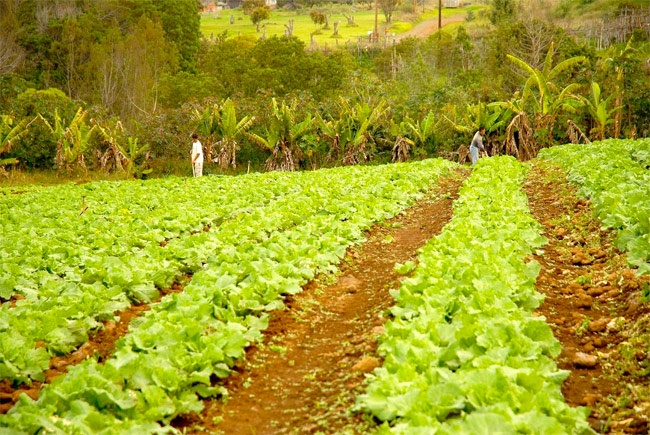
“Farming on Maui has to continue, and we all have an obligation to attract younger generations to go into the farming business,” Noel says. “Maui has to be self-sufficient in food production.” For his part, Noel helps farmers coordinate with J-1 visa sponsoring agencies to obtain trainees from the Philippines, a program which he has been involved with for more than 15 years.
“I always believe that farming on Maui is a viable and feasible business to engage with,” he says. “For one, we have an ideal and reliable climate for farming. On the marketing side, the local community is very supportive of our endeavors, and we have a lot of support groups, like UH Cooperative Extension Service and Maui County Farm Bureau.
“On the other side, we have a lot of challenges too. Shortage of labor is always there. We also have increases in our input cost. But challenges will always be a part of farming, and I believe that proper organization in operations, determination, passion in farming, consistency in production, good quality and safety can overcome these challenges.”


Agriculture in the (Virtual) Classroom
Maui County Farm Bureau will present its annual Ag in the Classroom Field Trip to schools this year in a virtual format. MCFB, along with our Ag Educator Partners, created a digital activity booklet and will be filming each of the activities. Here’s a preview of the booklet. Our goal is to deliver the virtual field trip lesson plan to second-graders islandwide by the end of April or early May.
| Mahalo to our agriculture partners: Bayer, College of Tropical Agriculture & Human Resources, Haleakalā Ranch, Maui Electric, and Maui Soil & Water Conservation Districts. |
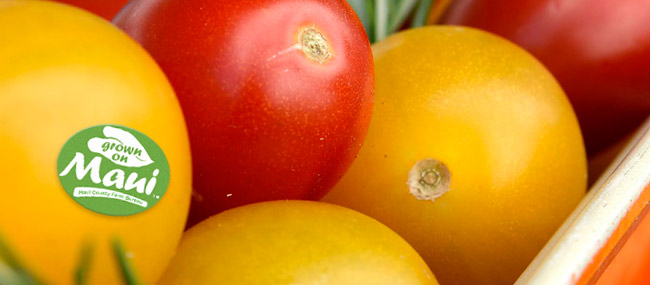
| Grown on Maui, Buy Local Campaign As mentioned earlier in this newsletter, Maui County Farm Bureau will launch a Grown on Maui, Buy Local campaign in June. Register to participate via MCFB’s website www.mauicountyfarmbureau.org/grown-on-maui/ and stay tuned for more details in our next newsletter. This is going to be an exciting program! We hope you can join us! |

Maui County Farm Bureau is Growing! We want to welcome our recent NEW and RENEWED members to our Farm Bureau Ohana:
Larry Cabanilla, L.B. Farms, LLC
Louis Coulombe, O’o Farms
John Caubble, The Aloha 360 LLC
Caley Chun Majewski, Chun’s Nursery Inc.
Lisa Foth, Maui Ku‘ia Estate Chocolate Inc.
Hayden Hanes, Hala Tropicals Maui
Kristin Mack Almasin, Ulupalakua Ranch
Michele Moore, Maui Protea
Kenneth Okamura, Okamura Farms
Lauren Shearen, Hawaii Flora & Fauna
Raven Sykes, Atrium Design Works
General Meetings Update – Look out for more information in next month’s newsletter for our first general membership meeting in 2021. The remaining general meetings are still scheduled for June, September and December.
Join MCFB! – Membership in the Maui County Farm Bureau is your best way to stay informed on all agricultural programs, issues, and educational opportunities that can impact your family farm or ranch. If you are a Friend of a Farmer, we welcome your support as well. Our new online portal makes paying for your membership easy and convenient. Learn about membership benefits here. Through your membership support, MCFB is able to advocate for the entire agriculture community.Join or renew membership here.

| Micro Grants Awarded to 105 Small Farms in Maui County Maui County’s $2.5 million Agricultural Micro Grants Program, administered by Maui Economic Opportunity, purchased tractors, chippers and other supplies; put up fencing and sheds; and established an online presence for 105 small farms in the county. [ Read Full Article Here ] |
| Hawai‘i Board of Agriculture expands coffee plant quarantine to slow spread of coffee leaf rust The Hawai‘i Board of Agriculture voted today to expand the coffee quarantine areas in Hawai‘i in an attempt to keep coffee leaf rust, a fungus that can threaten the state’s coffee industry, from spreading. [ Read Full Article Here ] |
